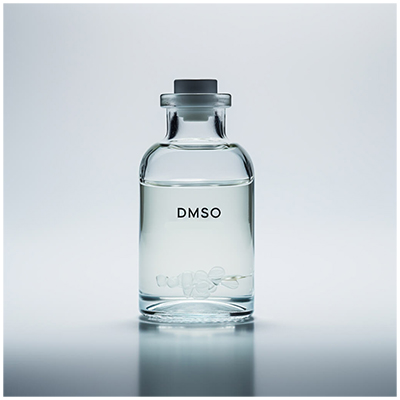How to Choose the Right DMSO: Considerations for Purity, Specifications, and Suppliers
Dimethyl Sulfoxide (DMSO), also known as (CH₃)₂SO, is a highly polar aprotic solvent that is colorless, odorless, and miscible with water.  It is widely recognized for its ability to dissolve a broad range of organic and inorganic compounds, making it a versatile chemical. DMSO plays a crucial role as a solvent in pharmaceuticals (e.g., drug formulation and delivery), veterinary medicine (e.g., anti-inflammatory treatments), laboratory research (e.g., cryopreservation and cell culture), and various industrial applications (e.g., polymer processing and paint stripping).
It is widely recognized for its ability to dissolve a broad range of organic and inorganic compounds, making it a versatile chemical. DMSO plays a crucial role as a solvent in pharmaceuticals (e.g., drug formulation and delivery), veterinary medicine (e.g., anti-inflammatory treatments), laboratory research (e.g., cryopreservation and cell culture), and various industrial applications (e.g., polymer processing and paint stripping).
The purpose of this guide is to assist buyers in evaluating DMSO by focusing on key factors such as purity, specifications, and supplier reliability. By understanding these elements, purchasers can make informed decisions that ensure product quality, safety, and suitability for their intended use, ultimately avoiding costly mistakes and ensuring compliance with application requirements.
Understanding DMSO Purity
Purity in chemical products refers to the percentage of the target compound (in this case, DMSO) present in the sample, with the remainder consisting of impurities like water, residual solvents, or byproducts from manufacturing. High purity minimizes unwanted reactions, contamination, or reduced efficacy in sensitive applications.
Common purity grades for DMSO include 99.5%, 99.7%, 99.8%, 99.9%, and even up to 99.995% for ultra-high-purity variants. For instance, HPLC-grade DMSO is often rated at ≥99.7%, while ACS reagent or pharmaceutical-grade options frequently exceed ≥99.9%.
The impact of purity varies by application:
In pharmaceutical and laboratory use, high-purity DMSO (e.g., ≥99.9%) with low water content and minimal impurities is essential to prevent interference in reactions, ensure biocompatibility, and comply with regulatory standards like USP or Ph. Eur.
For industrial use, lower grades (e.g., 99.5%) may suffice where precision is less critical, such as in cleaning agents or extraction processes, potentially reducing costs without compromising performance.
Tips for buyers: Always request Certificates of Analysis (CoA) from suppliers, which detail batch-specific purity, impurity profiles, and testing methods. Additionally, ask for third-party verification to confirm claims, and prioritize suppliers who provide detailed impurity breakdowns, such as limits on heavy metals or volatile organics.
Key Specifications to Evaluate
When evaluating DMSO, buyers should review its physical and chemical properties to ensure they align with application needs. Key properties include:
Boiling Point: Approximately 189°C, indicating thermal stability.
Freezing Point/Melting Point: 16-19°C, which means it can solidify at room temperature but remelts easily without degradation.
Appearance: Clear, colorless liquid; any discoloration may indicate impurities.
Density: About 1.10 g/mL at 20°C.
Refractive Index: n20/D around 1.479.
Vapor Pressure: 0.42 mmHg at 20°C.
Flash Point: 87°C (closed cup).
Moisture content is critical, often measured via Karl Fischer titration, with high-purity grades specifying ≤0.1% water to prevent hydrolysis or reduced solvency. Residual solvents or impurities, such as titratable acids (≤0.001 meq/g) or evaporation residue (≤0.01%), should be minimized to avoid contamination.
Packaging options vary by volume and include small glass or plastic bottles (e.g., 100 mL to 1 L for lab use), drums (e.g., 55 gallons for industrial), and Intermediate Bulk Containers (IBC tanks) for bulk shipments. Choose inert materials like HDPE or glass to prevent leaching.
DMSO is hygroscopic, absorbing moisture from the air, so storage requires sealed containers in a cool, dry place away from light and incompatible substances (e.g., strong oxidizers). It has good stability but should be handled with gloves due to skin penetration properties. Recommended handling includes using in well-ventilated areas and following SDS guidelines.
Here is a sample specification table for pharmaceutical-grade DMSO:
| Parameter | Specification |
| Purity (by GC) % | 99.99 |
| Water Content % | 0.0151 |
| Acid value mg KOH / g | 0.01 |
| Appearance | Clear, colorless liquid |
| Crystallization Point / ℃ | 18.49 |
| Transmittance (400 nm) / % | 100.0 |
| Refractive index (20°C) | 1.4780 |
| APHA color | 6 |
| Density (25°C) / (g/cm³) | 1.0960 |
Choosing the Right Supplier
Selecting suppliers requires assessing their qualifications and  capabilities. Look for product suppliers who can ensure compliance with safety requirements and environmental standards.
capabilities. Look for product suppliers who can ensure compliance with safety requirements and environmental standards.
Assess production capacity to ensure stable supply, and reputable suppliers can handle large-scale demand without delay.
Quality assurance is key: Suppliers should provide batch-specific CoAs, Material Safety Data Sheets (MSDS/SDS), and support third-party testing. Global compliance includes proper transportation classifications (DMSO is UN 1993 for flammable liquids), export licenses, and safety certifications like those for hazardous materials.
Prioritize customer service and logistics, including short delivery lead times (e.g., 1-4 weeks), flexible shipping options (e.g., air, sea, or ground), and tracking. Reliable suppliers offer technical support for application-specific advice.
Comparing Price vs. Value
Opting for the lowest price can lead to risks like inconsistent quality, supply disruptions, or non-compliance, which may result in rework or regulatory issues. Instead, focus on value: High-purity DMSO from certified suppliers might cost more upfront but ensures reliability.
Consider total cost of ownership, including delivery fees, specialized packaging to prevent contamination, and after-sales support like returns or technical consultations. A stable supply chain from a trusted supplier reduces long-term expenses by minimizing downtime and waste.
Practical Tips for Buyers
To mitigate risks, always request a small sample (e.g., 100-500 mL) before committing to bulk purchases—this allows testing for purity and compatibility in your specific application.
Compare multiple suppliers not just on price but also on documentation support, such as CoAs and SDS, response times, and customization options.
Ensure your facility has proper storage: Use airtight containers in a controlled environment (15-25°C) to maintain DMSO's integrity, and implement inventory rotation.
Building long-term relationships with suppliers can secure priority access during shortages, negotiated pricing, and early notifications of quality updates.
Conclusion
In summary, evaluating DMSO involves three main areas: purity (choosing grades like ≥99.9% for critical uses), specifications (verifying properties, moisture, and packaging), and supplier reliability (prioritizing certified, capable providers). By focusing on these, buyers can select DMSO that promotes safety, operational efficiency, and cost-effectiveness, ultimately supporting successful outcomes in pharmaceuticals, research, or industry.
Why Choose Aure Chemical for Your Dimethyl Sulfoxide Supply?
Aure Chemical is dedicated to providing superior chemical solutions and unparalleled customer support. By partnering with us for your Dimethyl Sulfoxide requirements, you benefit from:
Exceptional Purity & Consistent Quality: Our Dimethyl Sulfoxide is manufactured to stringent purity specifications, crucial for sensitive pharmaceutical, electronics, and chemical synthesis applications. We guarantee consistent performance batch after batch.
Reliable Global Supply Chain: We maintain a robust and efficient supply network, guaranteeing timely and secure delivery of this valuable chemical to your facilities worldwide, adhering to all strict safety and regulatory standards.
Expert Technical Support: Our team of experienced chemists and specialists is readily available to offer comprehensive guidance on product application, safe handling procedures, and optimal storage conditions for Dimethyl Sulfoxide, especially given its hygroscopic nature.
Commitment to Quality & Safety: We adhere to the highest industry standards for quality management, safety, and environmental responsibility across all our operations, ensuring peace of mind for our clients.
Choose Aure Chemical for a trustworthy and dependable supply of high-quality Dimethyl Sulfoxide. We're ready to support your most demanding and innovative industrial processes.
Related Articles
Looking for a reliable bulk supplier of Dimethyl Sulfoxide (DMSO)?
Aure Chemical provides high-purity DMSO raw materials for the pharmaceutical, polymer, and chemical industries.
View our DMSO product page
